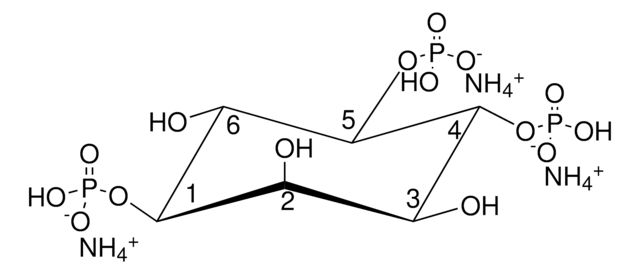850151P
Avanti
18:1 PI(4)P
Avanti Research™ - A Croda Brand 850151P, powder
Synonym(s):
1,2-dioleoyl-sn-glycero-3-phospho-(1′-myo-inositol-4′-phosphate) (ammonium salt)
About This Item
Recommended Products
Assay
>99% (TLC)
form
powder
packaging
pkg of 1 × 100 μg (with stopper and crimp cap (850151P-100ug))
pkg of 1 × 500 μg (with stopper and crimp cap (850151P-500ug))
manufacturer/tradename
Avanti Research™ - A Croda Brand 850151P
lipid type
cardiolipins
phospholipids
shipped in
dry ice
storage temp.
−20°C
SMILES string
[H][C@@](COP([O-])(O[C@H]1[C@H](O)[C@@H](O)[C@H](OP([O-])(O)=O)[C@@H](O)[C@H]1O)=O)(OC(CCCCCCC/C=C\CCCCCCCC)=O)COC(CCCCCCC/C=C\CCCCCCCC)=O.[NH4+].[NH4+]
InChI
1S/C45H84O16P2.2H3N/c1-3-5-7-9-11-13-15-17-19-21-23-25-27-29-31-33-38(46)57-35-37(59-39(47)34-32-30-28-26-24-22-20-18-16-14-12-10-8-6-4-2)36-58-63(55,56)61-45-42(50)40(48)44(41(49)43(45)51)60-62(52,53)54;;/h17-20,37,40-45,48-51H,3-16,21-36H2,1-2H3,(H,55,5
InChI key
XDKQBHORSIMQSB-QVUMANCCSA-N
General description
Application
Biochem/physiol Actions
Packaging
Legal Information
also commonly purchased with this product
Storage Class Code
11 - Combustible Solids
WGK
WGK 3
Flash Point(F)
No data available
Flash Point(C)
No data available
Regulatory Listings
Regulatory Listings are mainly provided for chemical products. Only limited information can be provided here for non-chemical products. No entry means none of the components are listed. It is the user’s obligation to ensure the safe and legal use of the product.
JAN Code
850151P-500UG:
850151P-BULK:
850151P-VAR:
850151P-100UG:
Choose from one of the most recent versions:
Certificates of Analysis (COA)
Sorry, we don't have COAs for this product available online at this time.
If you need assistance, please contact Customer Support.
Already Own This Product?
Find documentation for the products that you have recently purchased in the Document Library.
Customers Also Viewed
Our team of scientists has experience in all areas of research including Life Science, Material Science, Chemical Synthesis, Chromatography, Analytical and many others.
Contact Technical Service














